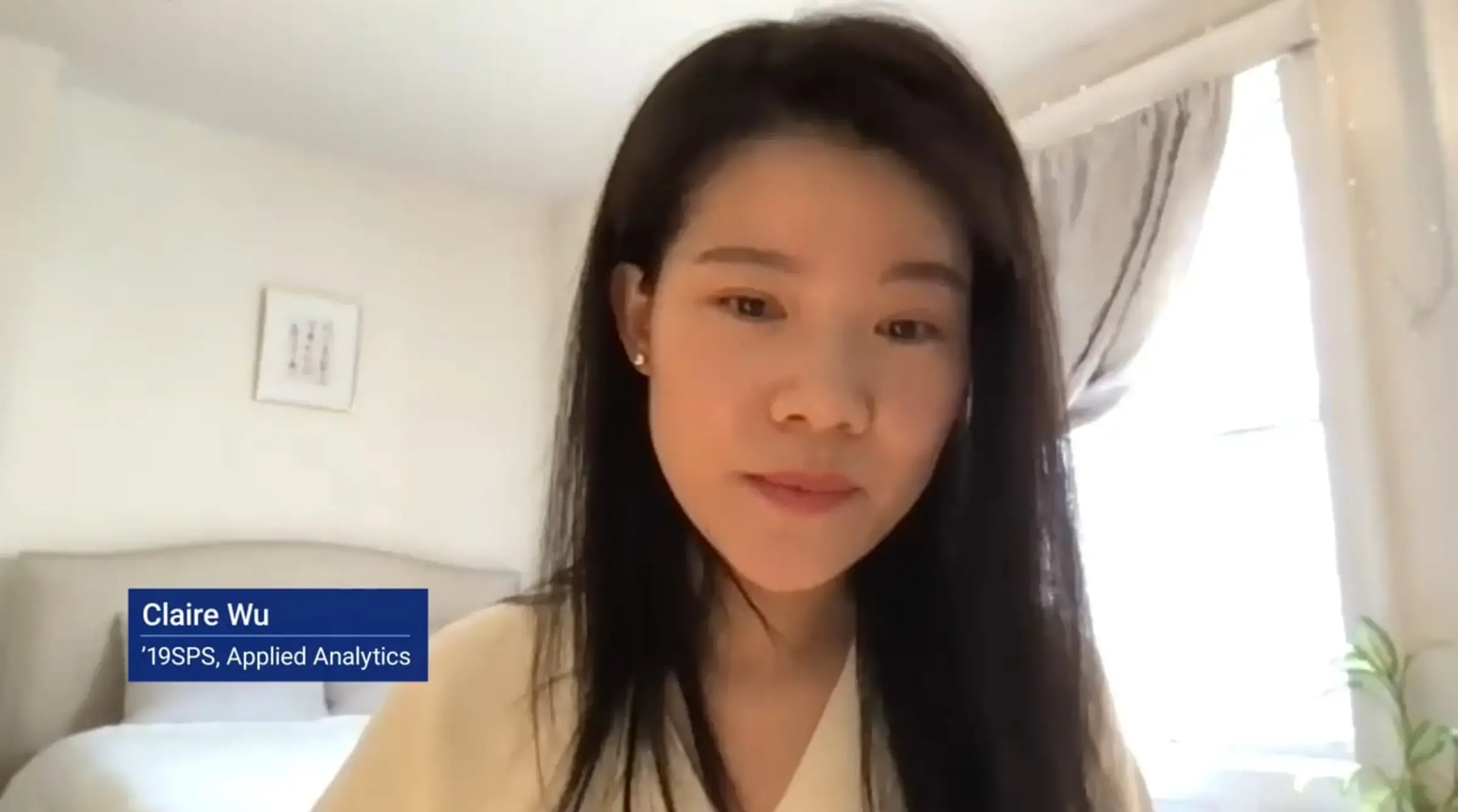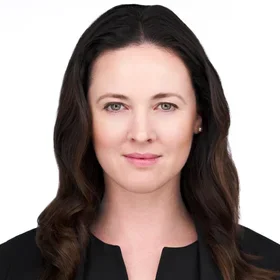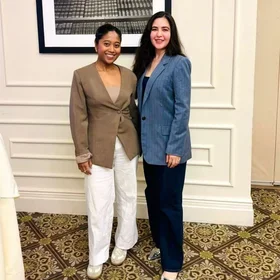In 2018, Jiaying (Claire) Wu enrolled in Columbia’s Applied Analytics M.S. program after five years of professional experience in marketing and was ready to kick her career into high gear. After graduation in May 2019, she joined Deloitte Consulting as a Data Scientist with the Hux Core Decisioning team. Today, Claire reflects on how she successfully navigated the job market and shares her advice for international students at Columbia who are seeking employment in the U.S.
This summer, SPS is offering a new course designed for incoming master’s students preparing to engage with top companies that are recruiting this fall. The U.S. Career & Communication Accelerator is a four-week online course that provides international students with hands-on practice, real-world application, and a competitive edge to help them tackle the U.S. job market confidently and competently.
What surprised you the most about the process of finding a job when you were a student?
I remember I was so surprised at how people were willing to help, especially Columbia professors and alumni. I received great support from Columbia’s network—people shared information with me about their daily jobs, their teams, insider views of the industry, and provided feedback on my portfolio website, which I created to showcase my data science capabilities. Referrals from this network really yielded many interview opportunities. Sometimes they’d even help to track the status of my applications, or introduce me to people in their networks who were hiring at the time or would be willing to offer insightful information.
An alumnus told me something that I'll always remember. He said, “I’m happy to help because job searching is never easy, and everyone has been there. My only ask from you is that one day you’ll pass this support to others too.” Since then, I have been helping students and have asked the same from them.
As a Columbia graduate, you already have the competencies—you need to show your ability to learn and adapt. Employers aren’t expecting you to master everything, especially for new grads. They want to see your learning agility and your passion for this field because companies pay for your future value."
What was the most important lesson that you learned when you embarked upon your career training?
It’s definitely always taking a step further; going the extra mile. A lot of students in data science know the basics: create a GitHub account, add projects and competitions to your GitHub, attend meetups, etc. But in order to stand out among the candidates, you need to take an extra step. For example, in addition to maintaining a GitHub page, consider building your professional portfolio website to connect all of your projects, create your narrative, and highlight key points of your career. It’s like an extended and more user-friendly version of your resume.
Another example is that before attending events, research the backgrounds of the panel speakers and ask specific questions. Print your resume and bring it to the events so you can give them out. Whether the panelists accept it or not, you should still come prepared. One more example is kicking up your answers to behavioral questions during interviews. We all know the STAR framework, but after you use it, offer your retrospectives, such as, if given a second chance, what would you have done differently? How would you have applied the most updated and relevant methods in the industry today? These extra steps can really help you to stand out.
What lesson do you wish you had learned or skills you had developed before you started interviewing with American firms?
From my perspective, I struggled with selling myself during the interview process. I had no problem specifying my abilities in a factual way, but I had to develop confidence when speaking about my skills and potential. I was always worried about some requirements in job descriptions, for example, the distribution system. Since I didn't have any experience with the system and I hadn’t taken any courses in that particular field, I was worried and not very confident. But I eventually realized that sometimes your potential speaks louder than what specific courses you’ve taken or systems you’ve used.
As a Columbia graduate, you already have the competencies—you need to show your ability to learn and adapt. Employers aren’t expecting you to master everything, especially for new grads. They want to see your learning agility and your passion for this field because companies pay for your future value. The hard skills could be dynamically changing all the time, especially in data science. So don't worry too much about which specific systems you don’t know, but confidently show the approaches you have taken to master a new skill and how you would quickly apply it in real cases.
The worst thing to do is doing everything by yourself. Please leverage those resources and reach out as much as possible."
Is there anything that you would've done differently when you were a student?
I would spend more time preparing to compete in the jobs market by learning even more about the data science theories and the underlying fundamentals. At school, you have the flexibility, the academic environment, and tremendous resources at Columbia –your professors, and your fellow students. Once you're working, it's a totally different environment. You can still learn (and you should definitely continue your learning journey as always), but sometimes you may not have as much time to dig deep into the nitty-gritty. So, leverage the time for theory studies while you still can as a student.
What advice do you have for international students who are pursuing their professional education here in the U.S.?
One’s international background can be a game changer. I would encourage international students to reflect and think about the unique experiences that they can leverage as their differentiators. Once in a case interview, I shared what I did for a marketing analysis project back in China in the cosmetics industry. At that time, our practices were drastically different from the approaches here, because the clients, the end-users, the markets, and the cultures varied so much. When I shared the project, they were super interested in what I learned from that experience.
Which resources did you use in your job preparation process?
The Career Design Lab really helped me a lot. I contacted the CDL at a very early stage when I was a student. Their support mattered so much to me, because it was not just about preparing for interviews and optimizing my resume, but also guiding me through the whole job search journey.
I know the CDL recently launched a new career platform. Students now have even more resources. The worst thing to do is doing everything by yourself. Please leverage those resources and reach out as much as possible.



